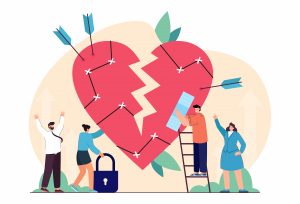Separation brings with it the emotional rollercoaster that comes with all grief and loss. You may experience a vast range of emotions including frustration, powerlessness, anger, denial, confusion and even relief. These feelings can lead to practical difficulties such as loss of appetite, trouble sleeping, difficulties at work and social withdrawal. While these are painful and distressing, these feeling are normal and with time, their impact will lessen.
The loss we experience when a relationship breaks down is not only about the loss of a partner and their company. There may be losses of social networks, financial losses and importantly, the loss of dreams and ideas: ideas about who you are, your place in the world, and how you thought your life was going to look in the future. This loss of ideas can be the hardest thing to cope with.
A breakup also brings uncertainty about the future. What will life be like without your partner? Will you find someone else? Will you end up alone? These unknowns can often seem worse than being in an unhappy relationship, which is one of the many reasons we sometimes hold on to something that is not working. Read these tips on how to manage loss with separation later in life.

How should you cope with it?
Go easy on yourself
Allow yourself time. Its valuable to take some space to reflect on things and re-evaluate your life, but balance is key – be careful not to spend too much time dwelling on the past. Give it some time – a good guide is to allow yourself at least one year of evaluation, growth and recovery. Remember that moving on is the end goal – getting stuck in hurtful feelings can prevent you from healing and moving forward. While some introspection is necessary and helpful, try to include some thoughts and actions to take that can improve things.
Establish boundaries
This is about protecting yourself from further pain that can come from prolonging the change. These boundaries may include limiting the time, energy and physical affection you give to your ex-partner. Although many people would like to ‘stay friends’, this is often a difficult task and may not be realistic or healthy, at least in the early stages.
Watch your thinking
Being as positive as you can be in your thinking and life choices will help your recovery and allow you to build a strong, healthy life post-separation.
Talk it out
Help from others is really important when going through any grieving process. Share your emotions with a friend, counsellor or your GP – it’s important not to try and “go it alone”.
Remember there is no right way to grieve
Acknowledge the ways in which you are experiencing loss. Take the time you need, and don’t let people tell you “you should be over it by now”.
Create some space
Even if you plan to stay in touch with your ex, you should aim for less contact with them straight after the break up – in order to work through your loss and develop your identity without that person in your life.
Look after yourself physically
Maintaining routines can give a strong sense of comfort and normality. Eat healthily and exercise regularly. Avoid unhealthy coping strategies such as drinking or drugs to numb the pain. Treat yourself like you’re getting over a sickness. Get plenty of rest, reduce other sources of stress in your life, and reduce your workload.
Don’t let your lifestyle stagnate
This life change is an opportunity to take a new direction, perhaps in an area you have been interested in but never had the time to pursue. Grow your connections, learn new skills, join new group. Move forward.
Reach out for support
Like many other tough times, it’s really important to have some support from those who care about you. It is critical to seek out help and support from professionals, friends and family – trying to ‘tough it out’ on your own can put you at great risk of depression and other mental and physical health problems. It can also help to write things down to give your feelings a space to vent.
Reach out for help here at Aventis Wellness

